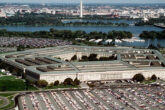January 15, 2025
The United States Can’t Afford to Not Harden Its Air Bases
For decades, the United States has relied on airpower and the qualitative superiority of its aircraft to gain an advantage over its adversaries. But that advantage is rapidly eroding. The Chinese military is fielding sophisticated air defense networks that include robust passive defenses, challenging sensors, and highly capable missiles and aircraft. In fact, by our calculations, the amount of concrete used by China to improve the resilience of its air base network could pave a four-lane highway from Washington, D.C. to Chicago.
China’s strike forces of aircraft, ground-based missile launchers, and special forces can attack U.S. airfields globally. The U.S. Department of Defense has consistently expressed concern regarding threats to airfields, and military analyses of potential conflicts involving China and the United States demonstrate that most U.S. aircraft losses would likely occur on the ground at airfields. Despite these concerns, the U.S. military has devoted relatively little attention to countering these threats compared to its focus on developing modern aircraft.
The United States can continue to largely ignore this menace and watch as risk levels increase, or it can face the reality and shape its forces and infrastructure to prevail.
U.S. airpower concepts have largely assumed that U.S. forces would deploy to forward airfields uncontested and that small-scale forward threats to airfields could be nullified. However, China is capable of mounting large-scale, sustained attacks against U.S. and allied airfields in the Indo-Pacific elsewhere. To generate airpower amid this onslaught, U.S. and allied forces need to devote a radical level of effort to learn how to “fight in the shade.”
This is the subject of our new report for the Hudson Institute. In the report, we make two observations. First, China seems to expect its airfields to come under heavy attack in a potential conflict and has made major investments to defend, expand, and fortify them. Second, American investments have been much smaller in scale and scope. Given the Chinese military’s threat to air bases, the United States needs to both be ready to disperse and undertake an urgent campaign to rapidly harden the bases that it and its allies and partners need to operate from in the event of a conflict with China. America has done so before in the face of other threats. To not do so today invites aggression — and could result in losing a major war.
Read the full article on War on the Rocks.
More from CNAS
-
The Department of Defense’s Breakthrough Nuclear Moment Risks Slipping Away
Unless they act, the Department of Defense’s breakthrough nuclear moment may vanish before it really happens....
By Will Rogers
-
DEFAERO Strategy Series [Apr 09, 25] CNAS' Becca Wasser and Phil Sheers on Revitalizing the U.S. Defense Industrial Base
On this episode of the Defense & Aerospace Report Strategy Series, sponsored by General Atomics Aeronautical Systems, Becca Wasser and Phil Sheers of the Center for a New Amer...
By Becca Wasser & Philip Sheers
-
From Production Lines to Front Lines
Executive Summary The U.S. defense industrial base (DIB) is struggling to meet the demands of the current strategic environment—let alone prepare for a potential conflict agai...
By Becca Wasser & Philip Sheers
-
The Pentagon’s Endangered Brain Trust
In this environment, sound assessments of emerging threats and new ideas to counter them will be especially vital....
By Dr. Andrew Krepinevich, Jr.




